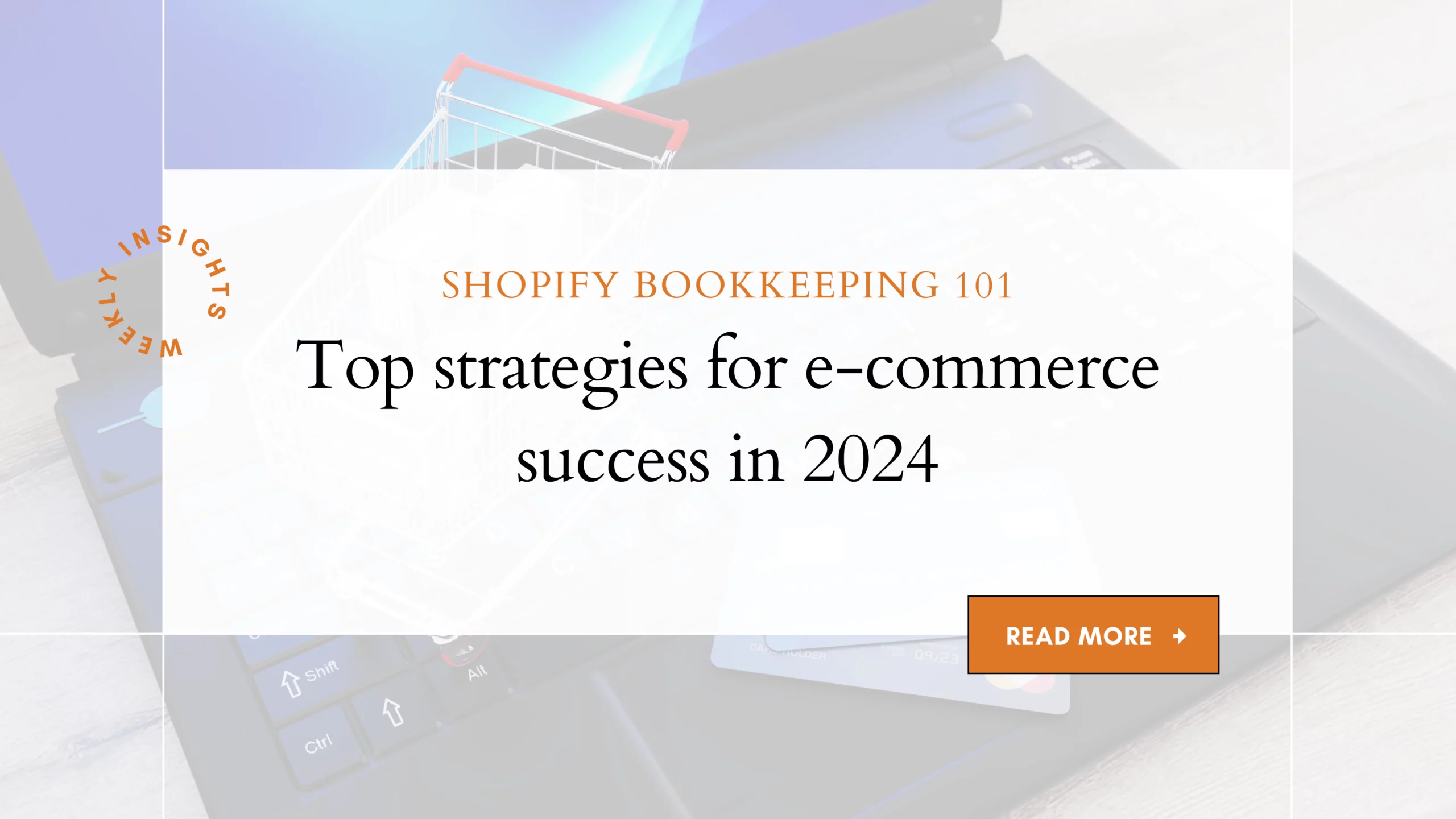August 2 2024 | By Farwah Jafri | 9 minutes Read

What is E-commerce Accounting?
What Does Shopify Bookkeeping Consist Of?
Steps to Set Up a Shopify Bookkeeping System
1. Choose an Accounting Method
2. Select Accounting Software
3. Set Up a Chart of Accounts
4. Integrate Shopify with Accounting Software
5. Record Opening Balances
6. Automate Invoicing and Payments
7. Track Inventory
8. Reconcile Accounts Regularly
How Can Cloud Accounting Software Help?
Why Would Hiring a Professional for Shopify Bookkeeping Help?
Expertise
Time-Saving
Financial Strategy
Error Reduction
Peace of Mind
Final Thoughts
Picture this; you wake up on your first day as a Shopify seller. The excitement of launching your online store is in the air. You have spent weeks designing the perfect website, curating products, and setting up marketing strategies. As your orders begin to pour in, you start thinking of your finances. Here’s where Shopify bookkeeping is needed.
You may feel the thrill of your business coming to life, but between all the buzz and excitement, finances can become a real challenge. Shopify bookkeeping is quite essential if you want to ensure your business is a success in the long run. Without an accounting system you can rely on, tracking expenses, revenues, and profits can quickly become overwhelming.
Your first few days as an e-commerce business owner are surely going to be a whirlwind of activity. You’re packaging orders, responding to customer inquiries, and updating inventory. It’s exhilarating but also overwhelming.
Amidst this excitement, the realization hits that managing the financial side of your business is something you haven’t really planned for. You need to track your sales, manage your inventory, handle returns and refunds, and ensure tax compliance. This is where effective Shopify bookkeeping becomes indispensable.
Before you dive in, however, it is essential to learn just what e-commerce accounting means;
E-commerce accounting refers to the recording, analyzing, and managing of financial transactions in an online business. Unlike the requirements imposed on traditional accounting, e-commerce accounting is burdened with the highly complex world of online sales that includes multiple payment gateways, digital products, and global transactions.
It also includes tracking sales, managing inventory, handling returns and refunds, and ensuring tax compliance. Proper bookkeeping for Shopify ensures that all these elements are accurately recorded, providing a clear financial picture of the business.

E-commerce bookkeeping for Shopify is made up of several components, all of which are equally important;
Setting up an effective Shopify bookkeeping system involves several key steps:
Decide between cash-basis accounting (recording transactions when cash changes hands) and accrual-basis accounting (recording transactions when they occur, regardless of cash flow). Accrual accounting is generally preferred for e-commerce businesses as it provides a more accurate picture of financial performance.
Use reliable accounting software that integrates with Shopify without any major hiccups. Popular choices include QuickBooks, Xero, and FreshBooks. These platforms offer various features that are just perfect for all your e-commerce needs, such as automated invoicing, expense tracking, and financial reporting.
Bookkeeping for Shopify should include creating a detailed chart of accounts that is specified to your e-commerce business, categorizing assets, liabilities, equity, income, and expenses. A well-structured chart of accounts can help you organize that financial data and simplify reporting for your business.
Connect your Shopify store with your chosen accounting software to automate data transfer and reduce manual entry errors. Integration ensures that sales, expenses, and inventory data are automatically updated in your accounting system.
Enter the initial balances for your accounts to establish a baseline for tracking financial transactions. This includes your starting inventory, cash on hand, and any initial investments or loans.
Set up automated invoicing and payment processing to restructure cash flow management. Automated systems reduce the risk of human error and ensure timely invoicing and payment collection.
Use inventory management tools to monitor stock levels, manage reorders, and calculate COGS accurately. Proper inventory tracking helps prevent stockouts and overstocking, optimizing your inventory investment.
Perform regular bank reconciliations to ensure all transactions are accurately recorded and discrepancies are resolved promptly. Regular reconciliations help maintain accurate financial records and identify any potential issues early.

Cloud accounting software offers numerous benefits for Shopify bookkeeping:
While cloud accounting software can help you manage bookkeeping for Shopify, hiring a professional accountant or bookkeeper can assist you with learning strategies that get you more control over your Shopify business:
Professionals bring special backgrounds and knowledge to the table which makes e-commerce accounting easier to manage. They can ensure accurate and compliant financial management. They are also well-versed in the unique financial challenges that e-commerce businesses face, such as managing inventory, handling multiple payment gateways, and tracking online sales tax.
E-commerce accountants are familiar with the unique regulations that apply to e-commerce business owners and can help you stay compliant with laws and guidelines that affect your business. They keep abreast of changes in financial legislation, ensuring your business remains compliant and avoids costly fines and penalties.
The ability to optimize your bookkeeping practices is another significant benefit of working with e-commerce accounting professionals. They are used to implementing best practices and utilizing advanced software. This not only increases the chances of you getting accurate financial records at the end of the year but also improves your overall efficiency, allowing you to focus more on strategic business decisions.
Outsourcing bookkeeping tasks frees up your time to focus on core business activities, such as marketing and product development. Handling your own bookkeeping can be time-consuming and distract you from the more critical aspects of running your business. By delegating these tasks to experts, you can ensure that your financial management is handled efficiently and accurately.
Delegating financial management to professionals allows you to concentrate on growing your business. When you are not bogged down with bookkeeping, you can dedicate more time to activities that drive revenue and expansion. This includes strategizing new product launches, enhancing customer experiences, and improving your marketing efforts.
Moreover, time saved from bookkeeping can be invested in innovation and strategic planning. As a business owner, your focus should be on steering your company towards its goals and vision. Outsourcing bookkeeping tasks ensures that your financial records are in capable hands, giving you the freedom to develop and implement growth strategies without the distraction of day-to-day financial management.
Expert assistance with Shopify for bookkeeping gets you valuable financial insights and advice, helping you develop strategies to take your profitability and growth to the next level. They can analyze your financial data to identify trends, strengths, and weaknesses, providing you with insights you can work with to grow. This detailed analysis also allows you to make informed decisions that improve your company’s performance.
Professional oversight reduces the risk of errors and discrepancies in your financial records. Accurate Shopify bookkeeping is essential for maintaining financial integrity and avoiding issues with tax authorities and stakeholders. Expert bookkeepers can use their expertise and advanced tools to ensure that all financial transactions are recorded correctly and consistently.
Accurate bookkeeping is crucial for making informed business decisions. Errors in financial records can lead to incorrect financial statements, which can mislead management and investors. By having professionals handle your bookkeeping, you can trust that your financial data is reliable, enabling you to make sound business decisions based on accurate information.
Knowing that your finances are in expert hands gives you peace of mind and confidence in your business operations. Managing the financial aspects of a business can be stressful, especially if you are not well-versed in accounting principles.
Hiring professionals to handle your bookkeeping alleviates this stress, allowing you to focus on what you do best – running your business.
A professional accountant can also complex financial tasks, providing assurance that your financial records are accurate and compliant. They take care of everything from daily transactions to preparing financial statements, ensuring that your books are always up to date.
By understanding e-commerce accounting, setting up a reliable accounting system, utilizing the right cloud accounting software, and relying on professional help, you can ensure accurate financial management and focus on growing your business.
Start your Shopify journey with confidence, knowing that your finances are well-managed and your business is on the path to success. Take the first step by contacting Monily’s experts and handing over your Shopify expenses to professionals who know what they’re doing!
Subscribe for business tips, tax updates, financial fundamentals and more.
MORE BLOGS

In the world of small businesses, managing finances can quickly become overwhelming. Enter the bookkeeper – a financial wizard who keeps your accounts in order, ensuring […]
Learn More →
In today’s digital world, small businesses are in for a tough time when it comes to managing their finances. Traditional bookkeeping methods are a real drag […]
Learn More →
The emergence of AI has impacted a number of sectors, including bookkeeping. AI bookkeeping solutions have been growing in popularity among small firms in recent years […]
Learn More →